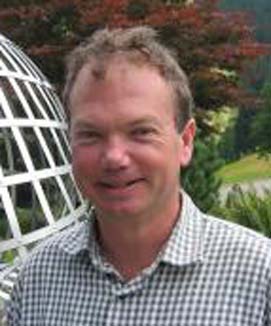


 تاريخ الرياضيات
تاريخ الرياضيات
 الرياضيات في الحضارات المختلفة
الرياضيات في الحضارات المختلفة 
 الرياضيات المتقطعة
الرياضيات المتقطعة
 الجبر
الجبر
 الهندسة
الهندسة 
 المعادلات التفاضلية و التكاملية
المعادلات التفاضلية و التكاملية 
 التحليل
التحليل
 علماء الرياضيات
علماء الرياضيات |
Read More
Date: 21-3-2018
Date: 21-3-2018
Date: 21-3-2018
|
Born: 29 May 1957 in Paris, France

Jean-Christophe Yoccoz was placed first in the entrance examination for the École Normale Supérieure and also for the École Polytechnique in 1975. He received the Agrégation de Mathématiques in 1977 in joint first position.
Yoccoz did his military service in Brazil in 1981-1983. He was a student of M Herman and submitted his doctoral thesis in 1985. As a student of Herman, a leading word expert on dynamical systems, it was not surprising that Yoccoz would himself work on dynamical systems. However, it was remarkable how quickly Yoccoz was to establish himself as the most brilliant researcher in this area. In his thesis, Yoccoz improved theorems of his supervisor Herman by giving simpler proofs but also obtaining the same results under weaker hypotheses.
Given his outstanding work it was clear that he would quickly be offered appointments and indeed he was appointed as professor at the University of Paris-Sud (Orsay). He became a member of the Institut Universitaire de France and a member of the Unité Recherche Associé "Topology and Dynamics" of the Centre National de la Recherche Scientifique at Orsay.
At the International Congress of Mathematicians in Zurich in 1994, Yoccoz received his greatest honour for this work on dynamical systems when he was awarded a Fields Medal. In his own address to the Congress, he began by stating the aim of his subject:-
Broadly speaking, the goal of the theory of dynamical systems is, as it should be, to understand most of the dynamics of most systems.
The theory of dynamical systems really began with Poincaré who was studying the stability of the solar system. This is typical of what the theory of a dynamical system tries to do: it describes how a system evolves over time given a rule which, for any particular state of the system, describes the following state. The solar system example shows exactly what one wants to know - given any configuration of the system it evolves according to Newton's laws but will it remain stable or, after many years, will one of the planets be ejected from the system?
After Poincaré, the theory was developed by a large number of mathematicians such as Arnold, Fatou, Herman, Julia, Kolmogorov, Palis, Siegel, Smale and Yoccoz. Douady writes in [3]:-
... they have proved stability properties - dynamic stability, such as that sought for the solar system, or structural stability, meaning persistence under parameter changes of the global properties of the system.
Yoccoz in his own address at the International Congress of Mathematicians in Zurich in 1994 said:-
The dynamical features that we are able to understand fall into two classes, hyperbolic dynamics and quasiperiodic dynamics; it my well happen, especially in the conservative case, that a system exhibits both hyperbolic and quasiperiodic features. ... we seek to extend these concepts, keeping a reasonable understanding of the dynamics, in order to account for as many systems as we can. The big question is then: Are these concepts sufficient to understand most systems?
Douady describes Yoccoz's contributions in general terms in [2] but in more detail in [3] which was the article describing the mathematics leading to the award of the Fields Medal. We quote [2] and advise those looking for more technicalities to consult [3]:-
He combines an extremely acute geometric intuition, an impressive command of analysis, and a penetrating combinatorial sense to play the chess game at which he excels. He occasionally spends half a day on mathematical "experiments", by hand or by computer. "When I make such an experiment", he says, "it is not just the results that interest me, but the manner in which it unfolds, which sheds light on what is really going on." Yoccoz has developed a method of combinatorial study of Julia sets and Mandelbrot sets - called "Yoccoz puzzles" - which permit deep insight.
Articles:



|
|
|
|
علامات بسيطة في جسدك قد تنذر بمرض "قاتل"
|
|
|
|
|
|
|
أول صور ثلاثية الأبعاد للغدة الزعترية البشرية
|
|
|
|
|
|
|
مدرسة دار العلم.. صرح علميّ متميز في كربلاء لنشر علوم أهل البيت (عليهم السلام)
|
|
|